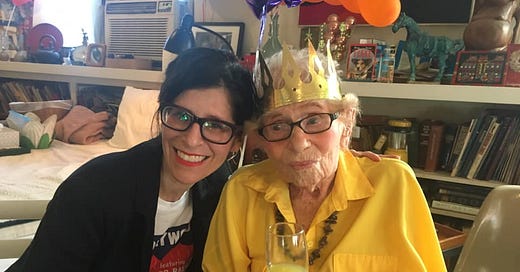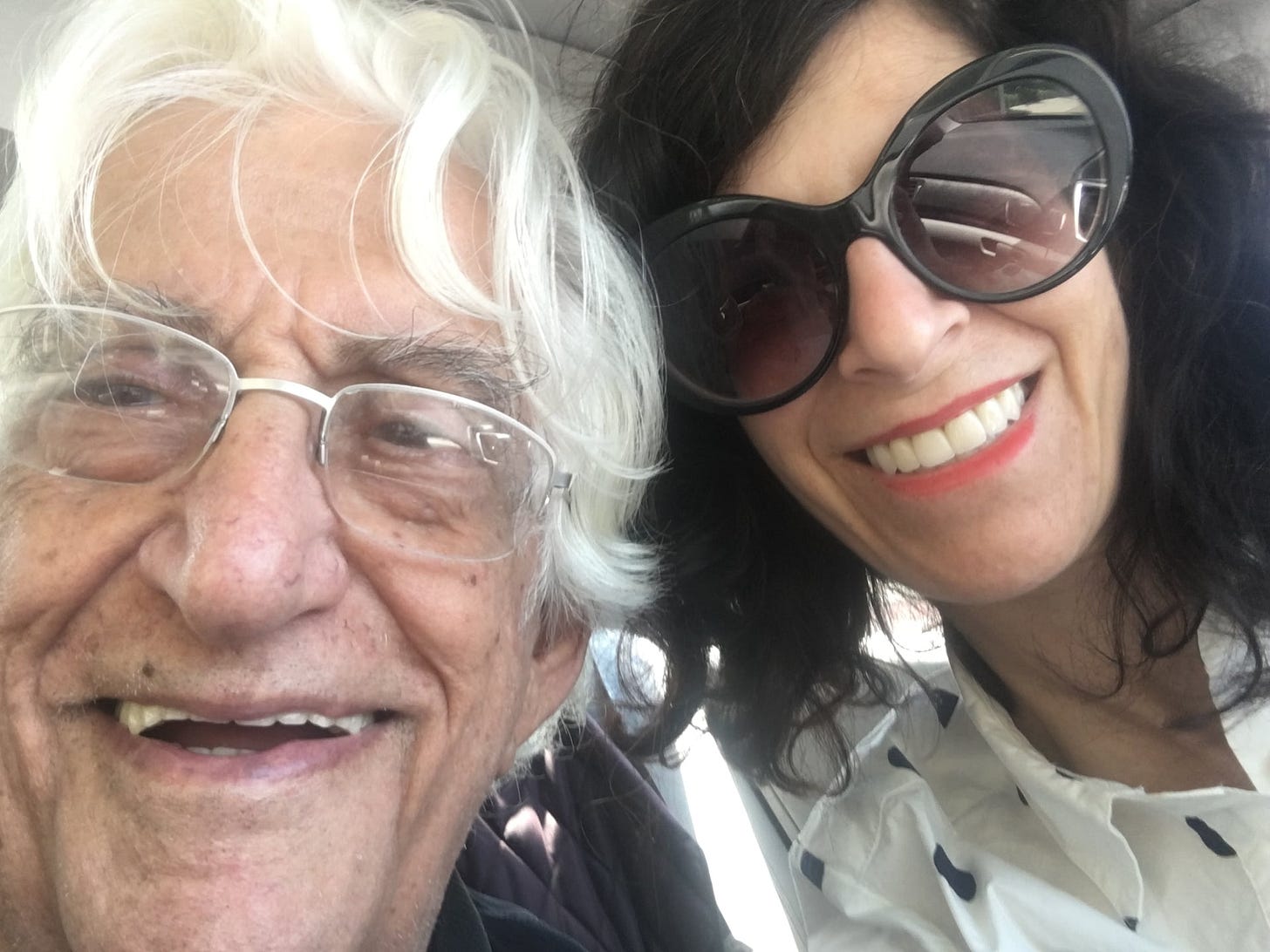What If Your Kids Won't Take Care of You When You're Older?
Let's Check On Our Neighbors and Make New Friends Instead
The NYT recently published not one, but two pearl-clutching articles about the fate of “kinless” older adults. “Kinless,” in these articles, is defined as people without partners/spouses, children, or siblings. (I reject the implication that friends aren’t considered “kin,” but I’ll dig into that later.) Both stories suggest that if you’re a greying adult (✔️) without kids (✔️), you’re destined to die alone and be eaten by raccoons. Okay, I made up the part about raccoons, but the rest is a pretty accurate summation. And while I commend the journalists for shining a light on the fact that our government is garbage at taking care of older adults, histrionics from “aging experts” aren’t particularly helpful. “What will happen to this cohort?” Dr. Schafer asked. “Can they continue to find other supports that compensate for living alone?” The screech of panic and thinly veiled judgement in that quote is a bit much. And the truth is, even if you have kids or siblings, that hardly guarantees a built-in caretaker.
My nonagenarian friend and next-door neighbor, Tina, who lived alone and passed away in 2020 at 99, had two children and a slew of grandchildren. Sadly, her daughter predeceased her. And her son—though he did pop in occasionally to bang a hammer at the sticky front door—was pretty much useless when it came to her actual care. Now granted, Tina was stubborn and often butted heads with her family. She relied on a neighbor/close friend to manage the bulk of her care with the support of several other neighbors, including me. If Tina took a fall, or couldn’t get her hearing aids to work, or needed her cat box cleaned, one of us rushed over to help. Eventually, professional caretakers helped during the day, but not at night. When her falls became more frequent, I gave her a Life Alert bracelet and programmed in phone numbers for a few neighbors. The first night, Tina rolled over on her wrist in her sleep and set off a chain of calls. A few of us showed up in pajamas to check on her. I suppose Tina’s situation was unique in that she lived on the street for 50 years and had formed strong bonds with the people close by. At the same time, I benefitted greatly from my friendship with Tina. She entertained me with her stories about hobnobbing with jazz greats and took an interest in my life and creative pursuits. We made each other laugh. She was like the grandmother I no longer had after my grandparents had passed on and I considered Tina my kin.
My friend, Harry, who I met in Zumba class at the YMCA when he was 84, was in a similar situation to Tina. His son lived across the country and their relationship was strained. Fortunately for Harry, his ex-wife looked out for him when he started to become forgetful and confused. I’d drive him to the gym once a week and take him to lunch, and we always had a blast together. Spending time with Harry felt like a second chance to bond with a dad-like figure and overcome some of the grief and loss I experienced after my father’s death. Like Tina, I considered Harry kin. In my five-year friendship with Harry before he passed away in 2021, his son only visited twice and rarely called.
One of the aforementioned articles does actually recognize that family isn’t always reliable; Of course, having family is no guarantee of help as people age. Estrangement, geographic distance and relatives’ own declining health can render them unwilling or unable to serve as caregivers. They also include some info about alternate living plans like cohousing, where communities of younger and older folks live in close proximity to help each other out with any needs that arise. But neither story mentions the positive impact of intergenerational friendships or how these relationships might help combat aging challenges. Instead, the reporting perpetuates negative stereotypes that older people sans offspring/spouses are helpless and doomed. Kinless Americans die earlier, they warn. Oh yeah? Tell that to Iris Apfel (101 and no kids) or the ghost of Betty White who lived to be 99 with zero kids and no husband. Or Dolly Parton (76, no kids) or Christopher Walken (79, no kids) or Stevie Nicks (79, no kids.) Sure, sounding the alarm about looming catastrophe makes a better headline, but what we really need is a shift in perspective about aging.
I’m not suggesting that we won’t face challenges or obstacles in our twilight years. I know that there’s great loss—friends and family members move out of town or pass away and it becomes harder to stay active and engaged. Don’t even get me started on the trials and tribulations of navigating our medical system if you have a health issue. Still, there are plenty of people in their 70s, 80s, and 90s enjoying life. A study found that people in their 80s experience less anger, worry or stress and that for many, it’s the happiest time of their lives. ⬆️ More of these stories, please!
What if reporting on aging focused less on the sorry state of single older adults and celebrated their accomplishments and lived experiences instead? How about encouraging friendship rather than pity? Perhaps more people would be motivated to reach out to an older or younger neighbor or acquaintance to form a meaningful friendship. Wouldn’t that make growing older less isolating and the world better? I think so.
I’m fortunate to have many friends and family members that I love among the living, yet I still miss Harry and Tina. Those relationships enriched my life in so many ways. My hope for the future is that we, as a society, embrace intergenerational friendships and redefine the word “kin” to include all caring relationships so that nobody ever feels “kinless.”
Here are a few organizations helping to foster intergenerational friendships in case anyone is interested in learning more:
Glamorgals.org
LoveForOurElders.org
BigandMini.com






This is just what's needed to balance the doom and gloom about 'grey tsunamis' etc - an ode to intergenerational friendships. I think the key to both of the friendships you describe is proximity and regularity, two things that many people find difficult to access... but it can be done! My partner and I share a home with his 92 year old mother and she'd struggle without us, but the benefits go both ways - my own outlook on ageing and my own inner ageist have been challenged and changed by living with her and I'm the better for it - and much more sanguine and realistic about the challenges and possibilities of ageing that I would have been without this setup. Thank you Hilary xxx
Encouraging friendships instead of pity - yes yes yes! Intergenerational friendships are a win-win. Such an excellent piece. Thank you!